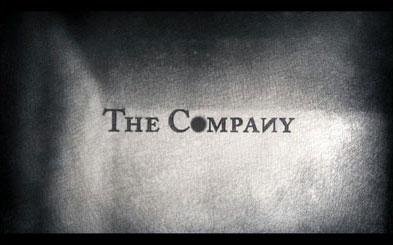
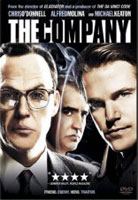 BUY IT AT AMAZON: CLICK HERE!
BUY IT AT AMAZON: CLICK HERE!
STUDIO: Sony Pictures
MSRP: $39.95
RATED: US = N/A, Canada = 14
RUNNING TIME: 3 Two-Hour TV Movies (286 min.)
SPECIAL FEATURES:
• Declassified: The Origins of The Company
• The Hidden Hand: The Making of the Company
• Covert Mission: DVD-ROM
• Sneak Peeks
The Pitch
Think of it as The Good Shepherd meets North and South, or The Adventures of Young Indiana Jones meets Mad Men, or one third of Band of Brothers in business suits. Point is, it’s the six-hour adaptation of the novel, The Company, which was too expensive (and too long) to make as a feature, and was thus made cheaper (and longer) for television.
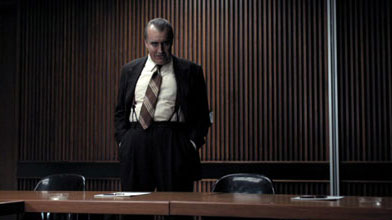
"Listen, I’ll make you a deal. You tell Frida to give me the idol, all right?
Or I’ll peel the flesh off her bones."
The Humans
Chris O’Donnell, Alfred Molina, Michael Keaton, Alessandro Nivola, Rory Cochrane, Tom Hollander, Natascha McElhone, Erika Maroszán, Ted Atherton, Ulrich Thomsen.
The Nutshell
A young, novice American spy (Chris O’Donnell) is witness to the sordid history of CIA Cold War-era operations over almost forty years, from East Berlin to Hungary, from Cuba to the States. Along the way, we see CIA operations change (but not necessarily evolve) and get a look at the toll the Cold War’s invisible trenches took on the soldiers who stalked the front lines. It’s not all great cinema, but it’s mostly good television.
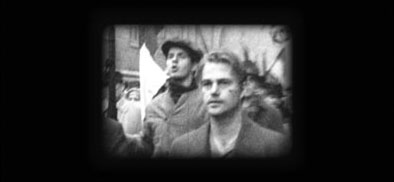
The footage the government didn’t want you to see:
Undeniable proof that Chris O’Donnell is not only a CIA agent,
but also a time-traveler.
The Lowdown
Here’s why it’s hard to review something like this: First, I don’t want to ruin anything for you, because the little surprises (or the reveal of not-so-surprising twists, more often) are what you’re watching for. Second, some things about The Company are really good but others are really not, so it’s tricky mashing all of that good and bad together without either turning you off to the whole thing with pedantic details or spoiling the fact that Chris O’Donnell’s character ends up being a transvestite assassin for the Mossad (he isn’t) so I can lure you in with little details.
Do I tell you everything that’s weak, and say, "Other than that…," which ends up with a deceptively negative review? Or do I ruin the miniseries to tell you what’s good about it, possibly damaging your experience when you watch it yourself? My life is hard.
I’m choosing not to spoil what can be spoiled, and give you, instead a blanket statement: It’s good. It’s not great.

"Seriously, Frida. Somebody had better get me a damn idol
or I am going to peel the flesh off of somebody!"
Now, I haven’t read the book, but in one of the press-kit-style behind-the-scenes segments, the producers and the writer keep talking about how good the dialogue in it is. To my ear, it didn’t translate to the screen. What we get is full of jargon and exposition, including exposition to explain the jargon. Characters use spy-tale expressions like "wilderness of mirrors" and "the great game" the way detective movies use words like "dame" and "sawbuck" when they’re trying to hard to be noir. Sometimes it works, but most of the time, in The Company, it sounded like an easy toss-in to "spy-up" the dialogue.
It’s weird. This miniseries has a great, fun cast (sometimes Chris O’Donnell is on, sometimes he’s not), but they waffle between natural(-ish) and theatrical in a manner that got in the way of my enjoyment. Sometimes that theatrical tone works, reminding me of The Untouchables episodes I just saw, like when the Sorcerer and his young protégé are on a moody-but-obviously-soundstage Berlin rooftop. Sometimes, like when Chris O’Donnell’s Jack McCauliffe is explaining some detail of the spy trade, it doesn’t.
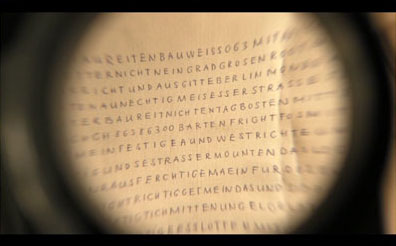
The press kit for National Treasure 2.
Historical details get bumped around for the sake of story, and I’m fine with that. For example, Able Archer didn’t happen when they say it does, but whatever. I’m just happy to see it turn up. Likewise, you’ll spot some anachronisms in sets and locations, but who cares? They do a lot with wardrobe and rental cars in these movies, and it works well enough. Add in the cinematographic twists and changes in Jeff Beal’s score over the course of the miniseries, and you get a nice sense of the decades going by.
Not all of the historical details are smooth enough to go down easy, though. Big historical figures get name-dropped with heavy-handed references during clunky expository scenes. At one point, we hear the US President off-screen, but comically don’t see him. It’s a gag, I guess, and it doesn’t work.
This is part of what makes The Company feel like a Young Indiana Jones movie. It’s a mix of historical action with often-good set pieces and brushes with history designed to teach us something. But where the Young Indiana Jones movies go balls-out with the educational material and the screen presence of major historical figures, The Company shies away from grabbing history by the hand, pulling it out of the audience, and getting it on stage.
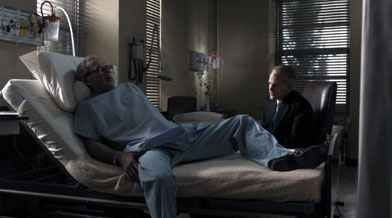
"You say the costume did this to you?"
"Yes! And this even without one of them nipple-suits."
"Are you in pain?"
"Oh, my, yes."
"But you’ve still got the costume on under there. Don’t you. Even now."
"Even now. You?"
"Damn straight."
Plus, the second part of the miniseries does the invasion of Hungary in the first hour and the invasion of Cuba in the second. This works fine, creating an action-centric second act to the larger story, but this two-part mash-up feels pretty damn Young Indy. Also, the jackets.
Despite what the talking heads tell you in the making-of, it’s not the script that makes The Company work. What caught my attention was the cast. Even with fun-to-watch blokes like Alfred Molina and Michael Keaton in this thing, it’s the little things that guys like Tom Hollander, Rory Cochrane, and Alessandro "Pollux Troy Got Eaten By Pterodactyls" Nivola do over the course of the series that sticks in my memory.
What kept my attention was the look of the whole thing. Colors change with the era. Textures are detailed and wonderfully used to evoke the place of each scene, from bombed-out Berlin streets to the sweaty air of a Cuban palace. This is television, but its photographic work is truly cinematic. Every time I opened my mouth to gripe about a line of dialogue, I ended up saying something like, "But, oh hey, that’s a nice shot."

"No, dear, but I get that a lot."
Special attention, here, needs to go to the black-and-white animated opening titles to the miniseries. They’re very handsome. Even better, they’re classy and provocative, blending with Linda Blair’s VO and Jeff Beal’s music to create a vaguely Carnivale vibe.
In some places, The Company is cheap-looking, but it’s never really bad-looking. Some of the painted establishing shots don’t work in the sense of being convincing, but they’re evocative. Plus, whoever this show’s tank-wrangler is does damn fine work. This isn’t such a made-for-TV production that they can’t drive a tank through a streetcar.
The Package
Don’t let the cover of the DVD case fool you. The Company is worth watching. The back cover gives a much better sense of the atmosphere of the show. Unfortunately, the package would give you no reason to blow TV-show money on this set. It’d be easy to mistake this for a two-hour movie, as packaged. If you think of the miniseries as a trilogy of two-hour TV movies, though (which it is), the price makes a bit more sense. Still, with the meager special features and pretty but less-than-rich storytelling, this may be a rental.
The behind-the-scenes stuff here consists mostly of press-kit style making-of featurettes. Ridley Scott is his usual frank self, though, letting us in on a bit of the business behind the show (and why The Company wasn’t made as a feature, as originally intended). Worst of all, they put trailers for other movies in the Special Features menu, which I’ve always thought of as making a bullet point out of ad content. "Buy the new special edition of our movie, now with 60 seconds of new footage and special commercials for our other DVDs!" Ugh.
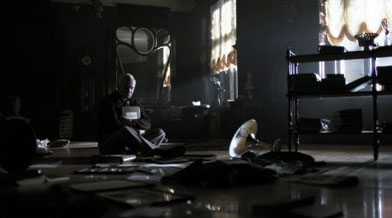
The WGA negotiator after the AMPTP has left the room.
In the end, The Company’s faults keep it from being a magnificent whole, but there’s a lot of good stuff over the course of six hours here. As a whole, it falls just short of being something really lasting, so I’ve landed it just short of a better rating. There are stretches of this miniseries that warrant 8.5 out of 10, and parts that are 6.5. But, being forced to boil it down, I go with this:
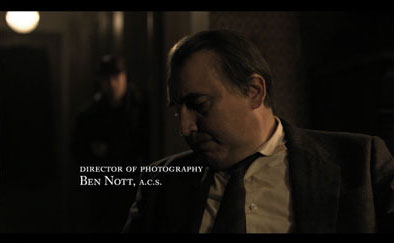
"All right, Ben Nott. You got skin? You got bones? Good."